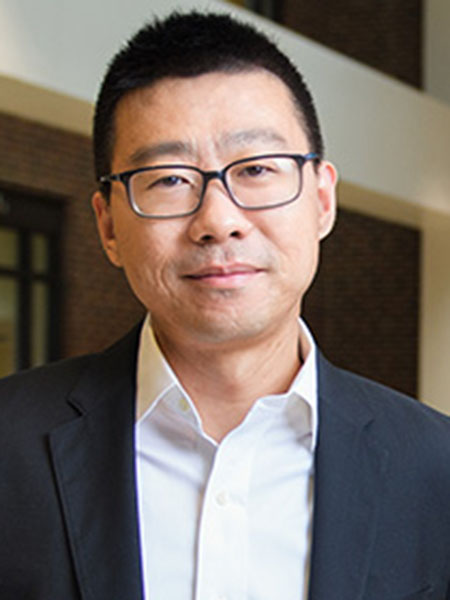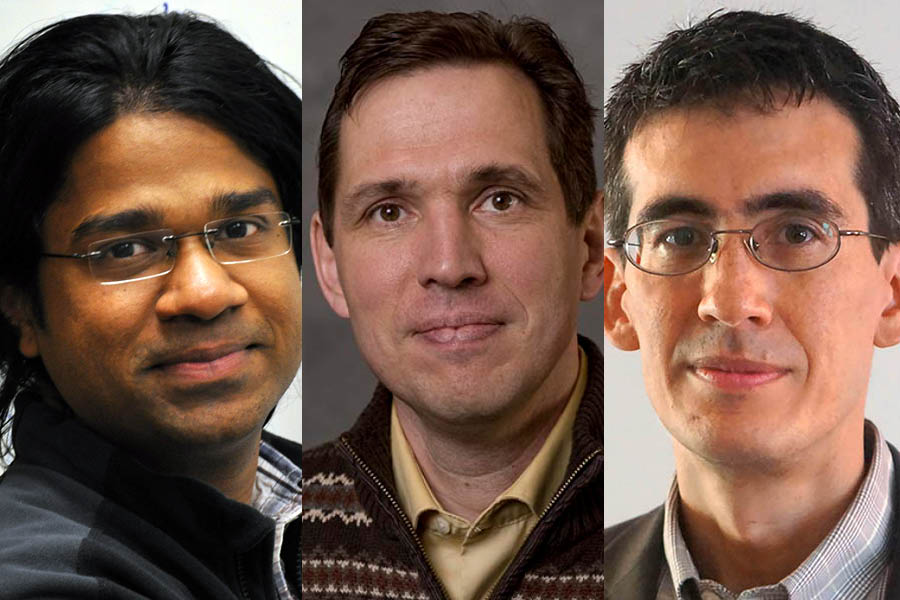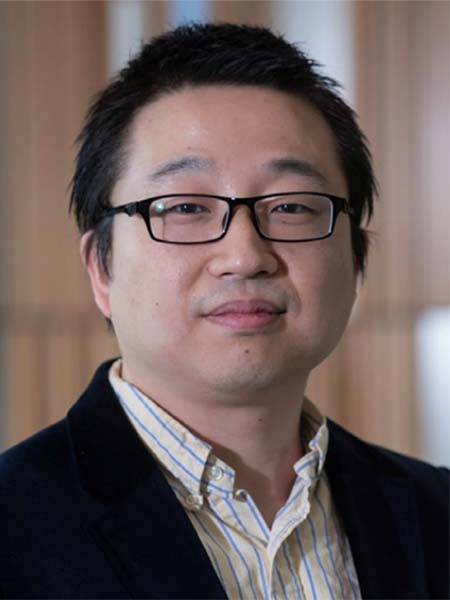College of Engineering faculty awards roundup
Letian Dou awarded NSF CAREER grant
Letian Dou, the Charles Davidson Assistant Professor of Chemical Engineering, is principal investigator of a research group that will receive funding from the National Science Foundation (NSF) to study the electronic properties of perovskites.

The study, “Understanding and Quantifying Ion Migration and Diffusion in Two-Dimensional Halide Perovskite Heterostructures,” will receive more than $500,000 over the next five years. The award is part of the NSF Faculty Early Career Development Program (CAREER).
Solar cells and light-emitting diodes (LED) could potentially use halide perovskites as the light absorber and emitter, respectively, if the perovskites were more stable in devices with short lifetimes. One of the key problems limiting the stability is that ions in halide perovskites are highly mobile, which causes quick materials and devices degradation. Dou and his team will develop novel structures from two-dimensional perovskites and quantify how ions diffuse and migrate under heat, light, and electrical bias.
“Through this project, we will elucidate the ionic diffusion and migration mechanisms in 2D halide perovskite heterostructures; identify the most promising materials stabilization strategies; and finally demonstrate high-efficiency LED devices with enhanced stability,” said Dou. “I believe this project will provide valuable knowledge to the field. Furthermore, we will disseminate basic materials science and semiconductor knowledge to a broader range of audiences and educate next-generation young scientists and engineers.”
The NSF Faculty Early Career Development (CAREER) Program is the National Science Foundation’s most prestigious award in support of early-career faculty who have the potential to serve as academic role models in research and education and to lead advances in the mission of their department or organization. Activities pursued by early-career faculty should build a firm foundation for a lifetime of leadership in integrating education and research.
Dou joined the Davidson School of Chemical Engineering in 2017. His research group focuses on the synthesis of hybrid materials, organic semiconductors, halide perovskites, and related optoelectronic properties and their device applications. He is also a pioneer in polymer single-crystal chemistry and materials.
Guillermo Paniagua receives Humboldt Research Award to share expertise in Germany
Guillermo Paniagua, professor of mechanical engineering, has received the prestigious Humboldt Research Award and will move to Germany for six months to conduct research at Technical University of Darmstadt (TU Darmstadt).

Named for the 19th-century Prussian scientist and explorer Alexander von Humboldt, the Humboldt Research Award recognizes internationally leading researchers whose fundamental discoveries, new theories, or findings have had a lasting effect on their discipline beyond their immediate research area and who are expected to continue producing outstanding research in the future. Winners are invited to spend up to one year collaborating on a long-term research project with specialist colleagues at a research institution in Germany.
Paniagua leads the Purdue Experimental Turbine Aerothermal Laboratory (PETAL), located at Maurice J. Zucrow Laboratories. It’s one of the world’s most advanced testing facilities for turbine aerothermal research, and he has been recognized multiple times for his contributions to turbine aerodynamics and heat transfer.
His collaborator at TU Darmstadt is Professor Heinz-Peter Schiffer. Both Schiffer and Paniagua lead Rolls-Royce University Technology Centers on their respective campuses. “They deal primarily with combustor-turbine interactions, while we focus on aerodynamics of high-speed small-size turbines,” said Paniagua. “Being together will help us develop many new ideas. We are going to be a great combination.”
While in Germany, Paniagua also plans to work with Professor Dieter Peitsch at TU Berlin and Professor Damian Vogt at University of Stuttgart, researching combustor technology concepts, including hydrogen-based combustors. “We have worked together on some small projects in the past, but we want to collaborate more deeply in the future, bringing German students here and sending Purdue students to Germany,” Paniagua said.
There will be some things to get used to, such as managing his Purdue projects from overseas. But like his heat transfer colleague Amy Marconnet, also a Humboldt winner currently researching in Germany, he discovered that COVID-19 has acclimated everyone to conducting activities remotely. “If you had asked me two years ago, I would have said it’s impossible to go,” he said. “But we’ve all learned how to have meetings remotely and share our work online.”
Three professors elected to 2022 Optica Fellows Class
Three Purdue Engineering professors — two with Purdue’s Elmore Family School of Electrical and Computer Engineering and another from Mechanical Engineering — have been elected to the Optica (formerly OSA) 2022 Fellows Class.
Zubin Jacob, Elmore Associate Professor of Electrical and Computer Engineering, Alexander Kildishev, associate professor of electrical and computer engineering, and Terrence Meyer, professor of mechanical engineering, are among 106 new fellows from 24 countries who were selected based on several factors, including distinguished contributions to education, research, engineering, business and serving the community.

“These members exemplify what it means to be a leader in optics and photonics,” said 2021 Optica President Connie Chang-Hasnain, Whinnery Chair Professor Emerita of EECS at University of California, Berkeley. “Election, by their peers, confirms the important contributions made within our field.”
Jacob is being recognized “for pioneering theory-driven experiments in the areas of thermal photonics and nanophotonic metamaterials.” Kildishev is being recognized “for outstanding contributions to the theoretical concepts and advanced numerical modeling of optical engineered materials and metasurfaces.” Meyer is being honored for “outstanding contributions in ultrafast coherent anti-Stokes Raman scattering and creative developments in pulse burst laser technology and its applications.”
Fellow membership in Optica is limited to no more than 10 percent of the membership and is reserved for members who have served with distinction in the advancement of optics and photonics.
The new Optica Fellows will be honored at the Society’s conferences and events throughout 2022.
IE’s Wenzhuo Wu joins Wiley editorial advisory board
Wenzhuo Wu, the Ravi and Eleanor Talwar Rising Star Associate Professor of Industrial Engineering, recently joined the Editorial Advisory Board of Advanced Engineering Materials, a research journal published by Wiley.

The journal highlights the latest breakthroughs in engineering materials and novel materials that are making those important first steps towards commercialization, with a strong focus on new manufacturing techniques. The Editorial Advisory Board consists of leading researchers from universities around the world.
In addition, Wu has served since 2020 on the International Editorial Advisory Board for Advanced Materials Technologies, also a publication of Wiley.
He is principal investigator of the Wu Group, which focuses on innovating nanotechnologies through the design, manufacturing, and integration of functional materials with controlled compositions and architectures across multiple length scales. The research goal is to generate hierarchical materials and structures with applications in ubiquitous sensors, wearable devices, nanoelectronics, optoelectronics, quantum electronics, energy, catalysis, and more.
Wu also serves as a Technical Committee member for the Nanomaterials Committee at the Minerals, Metals & Materials Society (TMS). The society aims to bring together leading researchers, academic scientists and industrials to describe and share their research results and experiences on all aspects of advanced nanomaterials. Wu is also currently a Technical Committee member for the Institute of Electrical and Electronics Engineers (IEEE) Nanotechnology Council Technical Committee on Nanomaterials.
